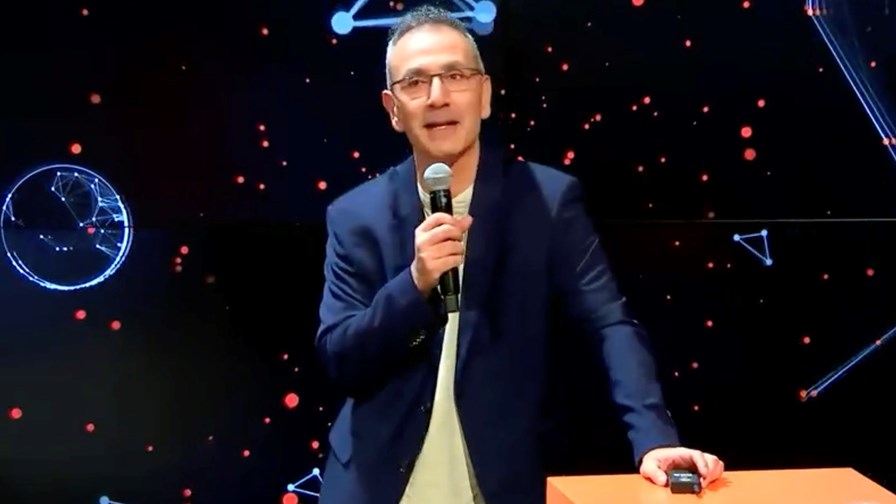
Orange CTIO Bruno Zerbib shares his views with attendees at the Orange Open Tech Day in Paris. Source: Orange.
- Orange chief technology and innovation officer (CTIO) Bruno Zerbib was in residence at MWC24 in Barcelona
- He discussed how Orange is thinking about the development of its network platform to support customers’ needs
- The industry needs to break away from generational technology steps and adopt a “continuous innovation” approach rather than be tied to the ‘Gs’
The telecom sector needs to break free of the generational straitjacket that has tied it to standards-led step changes in recent decades and instead embrace cloud-oriented processes and tactics that will deliver ongoing advances and an enhanced customer experience, Orange chief technology and innovation officer (CTIO) Bruno Zerbib told media and analysts during a briefing session held at MWC24 in Barcelona.
Zerbib noted that as the telecom and technology sectors become more intertwined and the barriers between them break down, so the telecom industry is “moving away from the more complex standards structures of the past and adopting new specifications and ways of working.” For example, the adoption of the Camara specifications for network APIs that are being developed under the auspices of the Linux Foundation and which are gaining increasing traction with the telecom operator community via the GSMA’s Open Gateway initiative, he said.
That particular initiative is important because it is helping to bring the mobile operator sector closer to the applications developer community, noted the CTIO. “We need to change our relationships with applications developers – we have not yet tapped the vast capabilities of the network in terms of what it can deliver to end users around cybersecurity, QoS [quality of service]” and much more.
“We want to unlock that. We need to defragment the telecom world to make it more attractive to app developers and we can do that by removing obstacles and developing new use cases that can impact customer experience,” he continued.
Taking that approach, though, requires a new way of working and a new way of thinking that is based more on the cloud-native tech sector’s approach to ongoing development and innovation and a greater embrace of open-source processes and open networking, and less on the generational developments, from 2G through to 3G, 4G and now 5G, that have defined progress and limited innovation.
“We need to get away from generational developments. I don’t want to be thinking about this G and that G – no more Gs! I’m not alone in thinking this,” stated Zerbib, and he’s right – that same frustration reared its head at the Great Telco Debate towards the end of 2022 – see An F for the Gs: 5G discontent surfaces for 2023.
He knows, though, that there is still plenty of talk about 6G and many developments leading to the next set of standards, but he doesn’t want to be tied down by such timelines and guidelines.
“There is talk about 6G… let’s add those capabilities to what we have now and embrace continuous innovation” instead of waiting until new capabilities and functionalities have been rubber-stamped as 6G. “Of course we need to revamp the radio access network to meet our needs but the customers don’t care about that – they care about being able to use reliable and secure services,” noted the CTIO, who wants to adopt the latest innovations as soon as they are ready to use.
Zerbib is nothing if not consistent – he was preaching the same gospel last December as he urged a shake-up of R&D and operational process during Orange’s Open Tech Day in Paris in November – see Orange CTIO embraces the ‘era of open’.
He might, then, be a bit frustrated to see that Orange shows up quite prominently in a study by research firm Global Data that focuses on which companies in the telecom sector are advertising most for 6G roles.
That aside, Zerbib is taking some inspiration from the way Orange works, and is perceived, in the Middle East and Africa (MEA) region, where the company has operations in 18 markets (all but one, Jordan, being in Africa).
“Orange is different to most other telcos in that it is international – it is not [just] a French company” – courtesy of its MEA footprint, he noted. In that region, Orange is “perceived as a technology company, not a telecom company – that’s a very different perspective. We have thousands of developers working in the region to develop new services and applications, working on cutting-edge technology, and they think of themselves as developers working for a tech firm, not a telco… Africa is our Silicon Valley,” stated Zerbib.
An indication of how the business is developing in a different way in MEA is the recent strategic partnership struck with Tencent Cloud, the cloud operation of giant Chinese technology conglomerate Tencent. Watch out for additional coverage of how that relationship is developing Orange’s services portfolio in Africa.
- Ray Le Maistre, Editorial Director, TelecomTV
Email Newsletters
Sign up to receive TelecomTV's top news and videos, plus exclusive subscriber-only content direct to your inbox.




